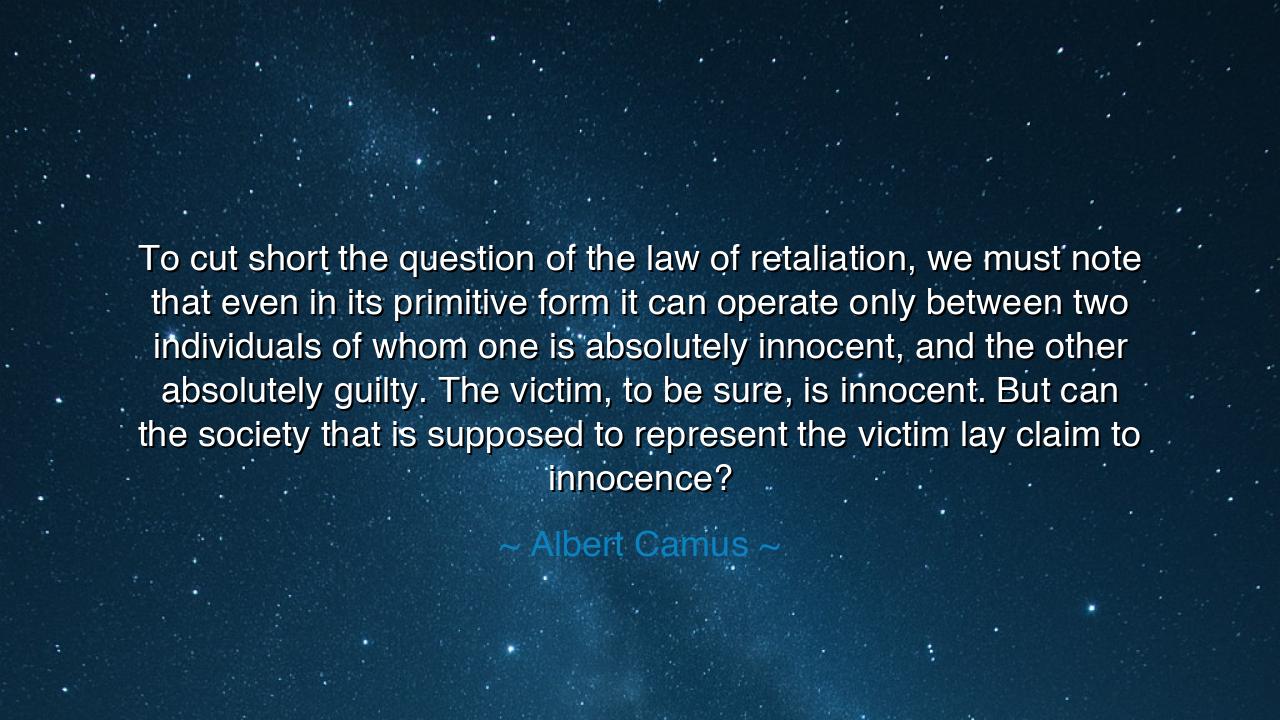
To cut short the question of the law of retaliation, we must note
To cut short the question of the law of retaliation, we must note that even in its primitive form it can operate only between two individuals of whom one is absolutely innocent, and the other absolutely guilty. The victim, to be sure, is innocent. But can the society that is supposed to represent the victim lay claim to innocence?






Hear the words of Albert Camus, philosopher of rebellion and conscience, who declared: “To cut short the question of the law of retaliation, we must note that even in its primitive form it can operate only between two individuals of whom one is absolutely innocent, and the other absolutely guilty. The victim, to be sure, is innocent. But can the society that is supposed to represent the victim lay claim to innocence?” These words pierce the heart of justice, for they ask whether punishment, especially the punishment of death, can ever truly be righteous when it is carried out not by the victim but by the flawed and compromised hands of society itself.
Camus speaks against the ancient principle of lex talionis—the law of retaliation, eye for an eye, life for a life. He does not deny its primal force; he admits that between two persons—one slain, the other guilty of the slaying—the balance seems clear. The victim is pure, the guilty is condemned. Yet, Camus asks, what happens when the act of retribution is not carried out by the hand of the injured, but by the state, by the collective body of men and women who make up society? Can this body claim the same purity, the same innocence, as the one who suffered? His answer is sorrowful: it cannot. For no society is spotless; it is marked by injustice, inequality, and violence of its own.
The ancients, too, wrestled with this. In Athens, Socrates was condemned to death by the vote of the people. His accusers claimed they represented the city and its values, but was the society that silenced him truly innocent? Or was it guilty of fear, of envy, of its own corruption? Socrates drank the hemlock, yet in his death the Athenians revealed not their justice but their failure. The law of retaliation, carried out by flawed institutions, did not heal Athens—it hastened its moral decline. Thus Camus warns us: when the collective takes upon itself the role of avenger, it acts not as an innocent hand, but as a compromised power.
Consider, too, the history of executions in the modern age. When France guillotined men and women in the frenzy of the Revolution, did the blade fall with the innocence of the victim? Or did it fall with the bloodlust of the crowd, the vengeance of a society inflamed by terror and passion? What began as justice soon became excess, and the guillotine, meant to avenge, became itself a symbol of injustice. In such examples, we see Camus’s wisdom: a society that punishes in the name of purity must ask whether it is pure enough to wield such a sentence.
The meaning of this quote, then, is not to excuse the guilty nor to dismiss the pain of the victim, but to remind us of humility in judgment. The law of retaliation, simple in theory, collapses when carried out by a body that is never wholly innocent. For every society bears sins: it neglects the poor, it commits injustices, it exploits, it oppresses. How then can it claim to kill in the name of innocence, when it has its own guilt to bear? Camus compels us to recognize this contradiction, and to see that true justice must seek not vengeance, but a higher form of mercy and responsibility.
The lesson is profound: beware the arrogance of collective purity. Do not believe that a state, a people, or a government can ever be wholly free of guilt. To kill in the name of innocence is to forget the stains on our own hands. Instead, we must build a justice that heals, that protects, that restrains evil without becoming its mirror. This is not weakness, but wisdom; not softness, but strength. For vengeance belongs to the passions of individuals, but justice belongs to the higher calling of humanity.
What, then, must we do? Resist the call of blind retaliation. Support systems of justice that correct rather than destroy, that reform rather than avenge. Remember always the humanity of even the guilty, for to strip them of humanity is to endanger our own. And above all, demand that society first examine its own failings before it dares to sit in judgment. For if we claim the right to punish in the name of innocence, we must first ask: are we ourselves innocent?
Thus remember: the victim may be pure, but the society is not. The law of retaliation, if carried out without humility, becomes but another crime. Camus’s voice, solemn and urgent, calls us to rise above vengeance and to build a justice worthy not of our rage, but of our shared humanity.






AAdministratorAdministrator
Welcome, honored guests. Please leave a comment, we will respond soon